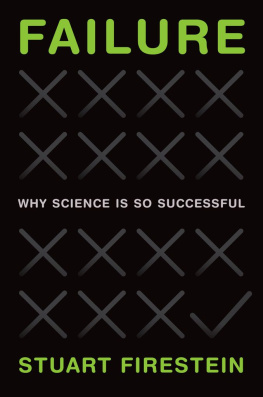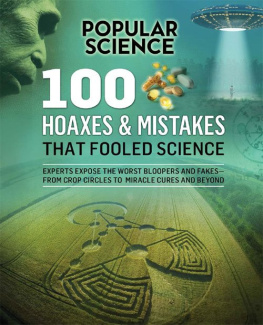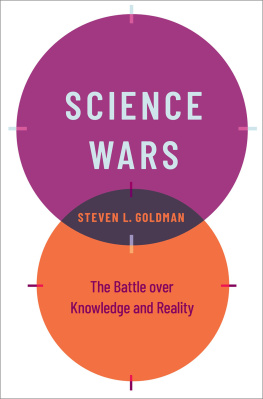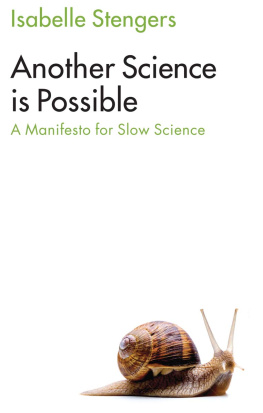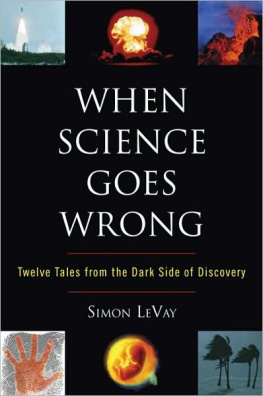Failure

Oxford University Press is a department of the University of Oxford. It furthers the Universitys objective of excellence in research, scholarship, and education by publishing worldwide.
OxfordNew York
AucklandCape TownDar es SalaamHong KongKarachi
Kuala LumpurMadridMelbourneMexico CityNairobi
New DelhiShanghaiTaipeiToronto
With offices in
ArgentinaAustriaBrazilChileCzech RepublicFranceGreece
GuatemalaHungaryItalyJapanPolandPortugalSingapore
South KoreaSwitzerlandThailandTurkeyUkraineVietnam
Oxford is a registered trademark of Oxford University Press in the UK and certain other countries.
Published in the United States of America by
Oxford University Press
198 Madison Avenue, New York, NY 10016
Stuart Firestein 2016
All rights reserved. No part of this publication may be reproduced, stored in a retrieval system, or transmitted, in any form or by any means, without the prior permission in writing of Oxford University Press, or as expressly permitted by law, by license, or under terms agreed with the appropriate reproduction rights organization. Inquiries concerning reproduction outside the scope of the above should be sent to the Rights Department, Oxford University Press, at the address above.
You must not circulate this work in any other form and you must impose this same condition on any acquirer.
Library of Congress Cataloging-in-Publication Data
Firestein, Stuart.
Failure: Why Science Is So Successful / Stuart Firestein.
pages cm
Includes bibliographical references and index.
ISBN 9780199390106
eISBN 9780199390120
1.Failure (Psychology).2.SciencePhilosophy.3.Discoveries in science. I.Title.
BF575.F14F567 2015
501dc23
2015009156
Contents
So many people deserve to be acknowledged for their many contributions that I am terrified of failing to be inclusive. Among the most important, though, is Alex Chesler. Right from the beginning Alex has been involved, as a teaching assistant for my first course in Ignorance while a graduate student in my laboratory and continuing with conversations over the years about failure and ignorance and the role they play in science. Alex could easily have coauthored this book with me, and we discussed precisely that on numerous occasions. However, the rigors and responsibilities of starting a new laboratory (at NIH) and a new family (two children with wife Claire, who was also a graduate student in my laboratory) made it impractical. But his mind and imprint are all over this book.
I was incredibly fortunate to have the opportunity to spend a sabbatical year (10 months in all) as a Visiting Scholar in the Department of the History and Philosophy of Science at Cambridge University. This book would have been finished a year earlier if it had not been for that sabbatical. And it would have been much the worse for it. The colleagues I interacted with there, the lectures that I attended, the long conversations over beer in the pubs (yes, it really is like that) added so much to this book that I cant imagine how I thought I could have written it before going there. A years sabbatical does not make one a philosopher or historian, but it does develop an appreciation for those pursuits and a sense of the value that they bring to understanding science and how we do it, and even why we do it.
Although the entire Department welcomed me in the most inclusive way, I have to single out Hasok Chang, who seems to have inherited the unenviable job of being my liaison in the Department. Generous is not nearly sufficient to describe his treatment of me. Not only with his time, but more importantly with his ideas and perspectives, and questions and critiques. You will see that I reference him several times in this book. He is one of the most important thinkers, and writers, and doers in science todayby which I mean the entire effort, from teaching to experimenting to contextualizing to chronicling and documenting it. I am thrilled that he and his brilliant and equally generous wife Gretchen continue to count me as a friend and colleague.
Many others at Cambridge listened to me rant about failure and responded with thoughtful and challenging ideas. Many read portions of the book here and there and commented freely. I have stolen mercilessly from them. I can hope only that they see it as the flattery which it is. I am also happy to be able to say that I was welcomed as an honorary Fellow at Kings College. There I shared meals and wine and conversation with people who have perfected the epicurean art of blending sociality with intellect. The opportunity to have dinner or lunch on any given day with scholars of music, Russian literature, mathematics, classics, biology, or psychology was for me like being the proverbial kid in a candy store. I cannot thank the Fellows at Kings College enough for so many of the memories of the most memorable year of my life.
The Alfred P. Sloan Foundation and the Solomon R. Guggenheim Foundation provided funds to support my time in Cambridge and for many of the other expenses associated with producing the manuscript. I am deeply indebted (not literally, fortunately) to them for their show of faith and their interest in the subject. I hope that they are proud of what has come from their investment.
As with Ignorance before it, I find it a bit ironic to thank people for their contributions to Failure. Believe me, though, they are responsible for whatever is successful here. Many colleagues read over versions of the manuscript from the early stages to late in its development. Among them I especially include Anne Sophie Barwich, a newly minted PhD who can be intensely critical and immensely fun at the same time, Charles Greer, Matthias Girel, Peter Mombaerts, Jonathon Weiner, and Matt Rogers, and Brian Earp, a student and now good friend I met while at Cambridge.
I am also quite fortunate in being a member of a writing group, called Neuwrite, composed of scientists, from graduate students to lab heads, and writers, from students to professionals, all of whom are interested in the unique problems of writing good science for a wide audience. Remarkably, this group has continued to meet regularly for over seven years, and from it have emerged books, magazine articles, essays, newspaper pieces, films, and short stories that have appeared in a wide variety of venues, both online and in print (see http://www.columbia.edu/cu/neuwrite/members.html). Several chapters of this book have been workshopped by this group, and I have gotten many useful and challenging comments from the group and many of its members individually.
I am very lucky to have the backing of Oxford University Press, in particular Joan Bossert, who has been a great supporter, exceptional editor, and very good friend and martini partner; and the excellent staff of publicists, editors, and production people who worked on Ignorance and now on Failureand must be wondering what in the world could be coming next.
I was incredibly fortunate to have leased a small house from the Duncans, former Cambridge faculty members, on the aptly named Eden St. This house provided the perfect setting for reading, thinking, and, most importantly, writing. I tended to a growing community of diverse birds who visited regularly in the backyard. It still makes me a little homesick not being there.
Finally, I must acknowledge, even though that word hardly captures the debt I owe them, my wife and daughter, who went through

